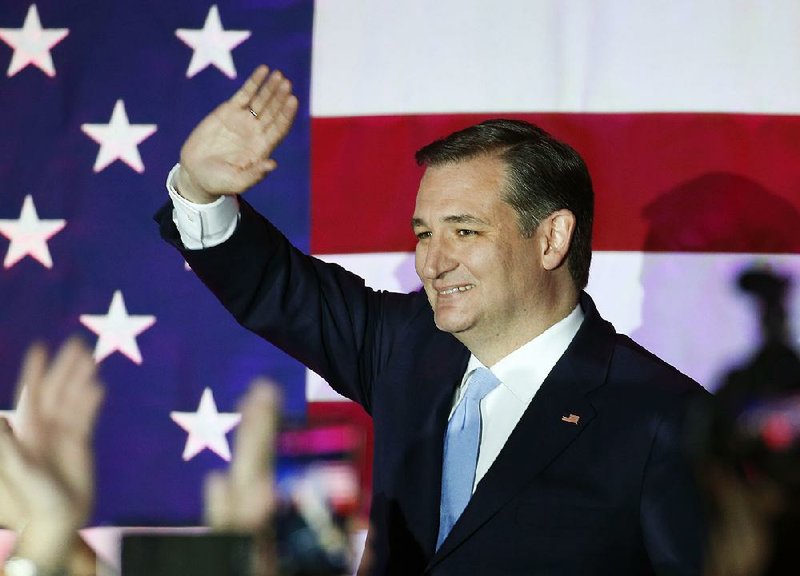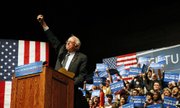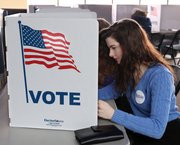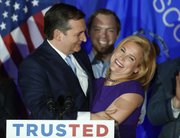MILWAUKEE -- Republican Ted Cruz captured victory in Wisconsin in his efforts to block front-runner Donald Trump's path to the presidential nomination and push the GOP nomination to a contested convention.
RELATED ARTICLES
http://www.arkansas…">Trump: Grab remittances
FULL ELECTION COVERAGE
"Tonight is a turning point," Cruz told cheering supporters at a victory rally. "It is a call from the hardworking people of Wisconsin to America. We have a choice. A real choice."
Among the Democrats, Bernie Sanders carried the night as the latest in a string of victories against former Secretary of State Hillary Clinton. But his win still leaves him behind Clinton in the delegate total, setting up continued battles in Wyoming this weekend and in New York later this month.
At a raucous rally in Wyoming, which has Democratic caucuses Saturday, Sanders cast his own victory as a sign of mounting momentum for his campaign.
"With our victory tonight is Wisconsin, we have now won seven out of eight of the last caucuses and primaries," he declared.
Clinton congratulated Sanders on Twitter and thanked her supporters in Wisconsin. "To all the voters and volunteers who poured your hearts into this campaign: Forward!" she wrote.
As the statewide GOP winner, Cruz nets a guaranteed 18 delegates; the remaining 24 are awarded by the state's eight congressional districts, each awarding three to its winner. The Democrats award all 86 of their delegates proportionally.
With a loss in Wisconsin, Trump was stalled on his way to securing 1,237 delegates needed to clinch the nomination. Cruz, a U.S. senator from Texas, had pegged a victory in Wisconsin crucial in a GOP race that has been dominated by Trump. In the lead-up to Wisconsin, the New York businessman has endured one of the worst stretches of his campaign.
"What we are seeing in Wisconsin is the unity of the Republican Party manifesting," Cruz said during one of his final campaign stops.
But Trump was unbowed. His campaign put out a biting statement: "Ted Cruz is worse than a puppet -- he is a Trojan horse, being used by the party bosses attempting to steal the nomination from Mr. Trump."
It added the businessman has "total confidence" he will win the Republican nomination.
"Mr. Trump is the only candidate who can secure the delegates needed to win the Republican nomination and ultimately defeat Hillary Clinton, or whomever is the Democratic nominee, in order to Make America Great Again," the statement said.
Cruz gained significant support in Wisconsin in the past few days thanks to an endorsement by Wisconsin Gov. Scott Walker and influential Wisconsin talk-radio hosts.
Speaking on Fox & Friends, former New York Mayor Rudolph Giuliani -- who has not made an endorsement in the race -- said support for Cruz by Walker has given the Texan a critical boost.
"Walker may have one of the better operations in the country, because of the way it's been tested," Giuliani said, referring to the 2012 recall challenge and other elections the governor has survived. "Absent the Walker machine, Trump wins Wisconsin."
Cruz also owes some thanks to Trump, who has spent the time since the last GOP primaries inflicting a series of disasters on his own campaign.
Leading up to Wisconsin, Trump was embroiled in a spat involving Cruz's wife, which he now says he regrets, was sidetracked by his campaign manager's legal problems after an altercation with a female reporter, and backtracked on comments about abortion.
In an interview Tuesday with MSNBC's Chris Jansing outside a polling site in Waukesha, Trump admitted that he made missteps even as he refused to concede that polls showing him trailing Cruz were accurate.
"But I've had worse weeks on the campaign. I mean, I've had so many weeks that -- I think a couple that were worse. And in one case I went up in the polls," he said. "So, you know, it couldn't have been so disastrous."
Trump also has dismissed speculation about a possible break in his momentum by pointing to his strengths in New York -- his home state, which holds its primary April 19 -- and in the string of Eastern states that vote later this month.
the Kasich factor
Complicating the primary landscape for both Cruz and Trump is the continuing candidacy of John Kasich. The Ohio governor's only victory has come in his home state, but he's still picking up delegates that would otherwise help Trump inch closer to the nomination or help Cruz catch up.
Trump has grown increasingly frustrated with the governor and has joined Cruz in calling for Kasich to end his campaign. Kasich cast Trump's focus on him as a sign that he's best positioned to win over the businessman's supporters.
"They're not really his people," Kasich said. "They're Americans who are worried about, they're really most worried about their kids, are their kids going to have a good life?"
Kasich's chief strategist, John Weaver, wrote a memo distributed Tuesday night that predicts a contested convention. "Tonight's results will solidify the fact that no candidate will reach Cleveland with 1,237 bound delegates," Weaver wrote.
Cruz spokesman Jason Miller said Tuesday night that "Kasich has to realize the only thing he's doing is helping Donald Trump."
Anti-Trump Republicans, who have poured millions of dollars into attack ads around the country, are hopeful that a loss in Wisconsin would signal a break in the momentum that has kept Trump steadily rising in the polls.
Paul Lorentz, was in line at 6:30 a.m. Tuesday in Sun Prairie, to cast his vote for Kasich. Lorentz said he typically votes Democratic in the general election but Republican in Wisconsin's open primary in order to sway the GOP to a better candidate.
"My hope is always to have two acceptable candidates running for president," he said.
Lisa Oleniczak said she voted for Trump at a precinct in Oak Creek, just south of Milwaukee.
"He's not from the establishment," she said, referring to the party members who align themselves with the party's traditional power structure.
But Ron Kurtz, 67, said he voted for Cruz because Trump's attacks on U.S. Sen. John McCain, R-Ariz., and other elected GOP officials had gone too far.
"I don't like some of Trump's statements -- like cutting down McCain for being captured," he said, regarding the Arizonan's time as a POW during the Vietnam War.
With Trump's stumbling in Wisconsin, his campaign manager said the businessman is planning a series of policy speeches in more formal settings. Corey Lewandowski said in an interview Tuesday that a memo detailing how Trump plans to get Mexico to pay for his proposed border wall is a prelude to a series of moves that flesh out the policies that Trump has been speaking about in general terms in his rallies and in interviews.
Among the topics he will address are how to strengthen the nation's military, specific education changes and the criteria by which a President Trump would select Supreme Court justices.
new york state of mind
Aides to Clinton, who spent the day in New York City, had been predicting a potential loss in Wisconsin for months.
In the run-up to Tuesday, Clinton campaigned fewer days and before smaller crowds in Wisconsin than Sanders. Clinton's campaign didn't host an election-night party, instead scheduling an evening fundraising event in New York.
She had already turned much of her attention ahead to the larger stakes in New York, where she a home-state advantage as its former senator. Sanders, who was born in Brooklyn, also claims New York ties.
After holding a rally Monday night in Milwaukee, Sanders mingled with voters and stayed for breakfast Tuesday morning at the Blue's Egg diner, a city institution.
"If people come out to vote in large numbers, I think we're going to do very, very well," Sanders told reporters as he entered the restaurant with Barbara Lawton, a former Wisconsin lieutenant governor, before ordering blueberry pancakes.
Dale Dulberger, 66, of nearby Wauwatosa said he heard on the news that Sanders was at the diner and wanted to stop by to say hello after having voted for him Tuesday morning.
"I think he's really authentic," Dulberger, who teaches at a county technical college, said of Sanders. "I think people believe what he's saying. His proposals are idealistic, but that's what a president is supposed to do."
Donna Ernst, who sells insurance and lives in nearby New Berlin, waited outside the diner to see Sanders, and said voting for him was an easy decision.
"He has a heart," said Ernst, 43. "He's not corrupt. He's not greedy."
Before the Wisconsin contest, Clinton had 1,243 delegates to Sanders' 980. When including superdelegates, the party officials who can voice public support for any candidate and shift their backing at any time, Clinton held a much wider lead -- 1,712 to Sanders' 1,011. It takes 2,383 delegates to win the Democratic nomination.
Information for this article was contributed by Julie Pace, Scott Bauer, Jill Colvin, Jonathan Lemire, Hope Yen, Stephen Ohlemacher, Bryna Godar and Greg Moore of The Associated Press and by John Wagner, David A. Fahrenthold, Juliet Eilperin, Sean Sullivan and Philip Rucker of The Washington Post.
A Section on 04/06/2016




